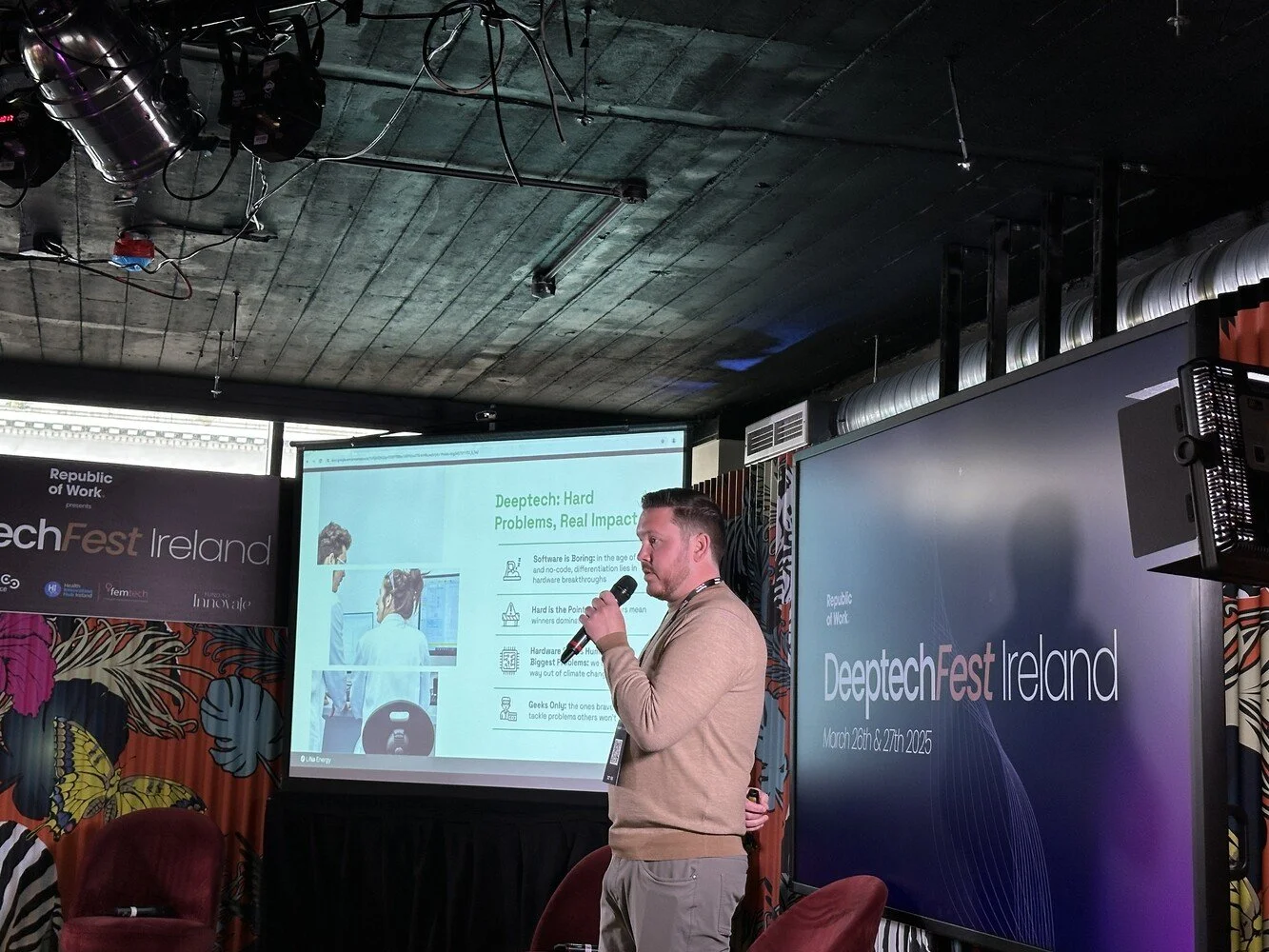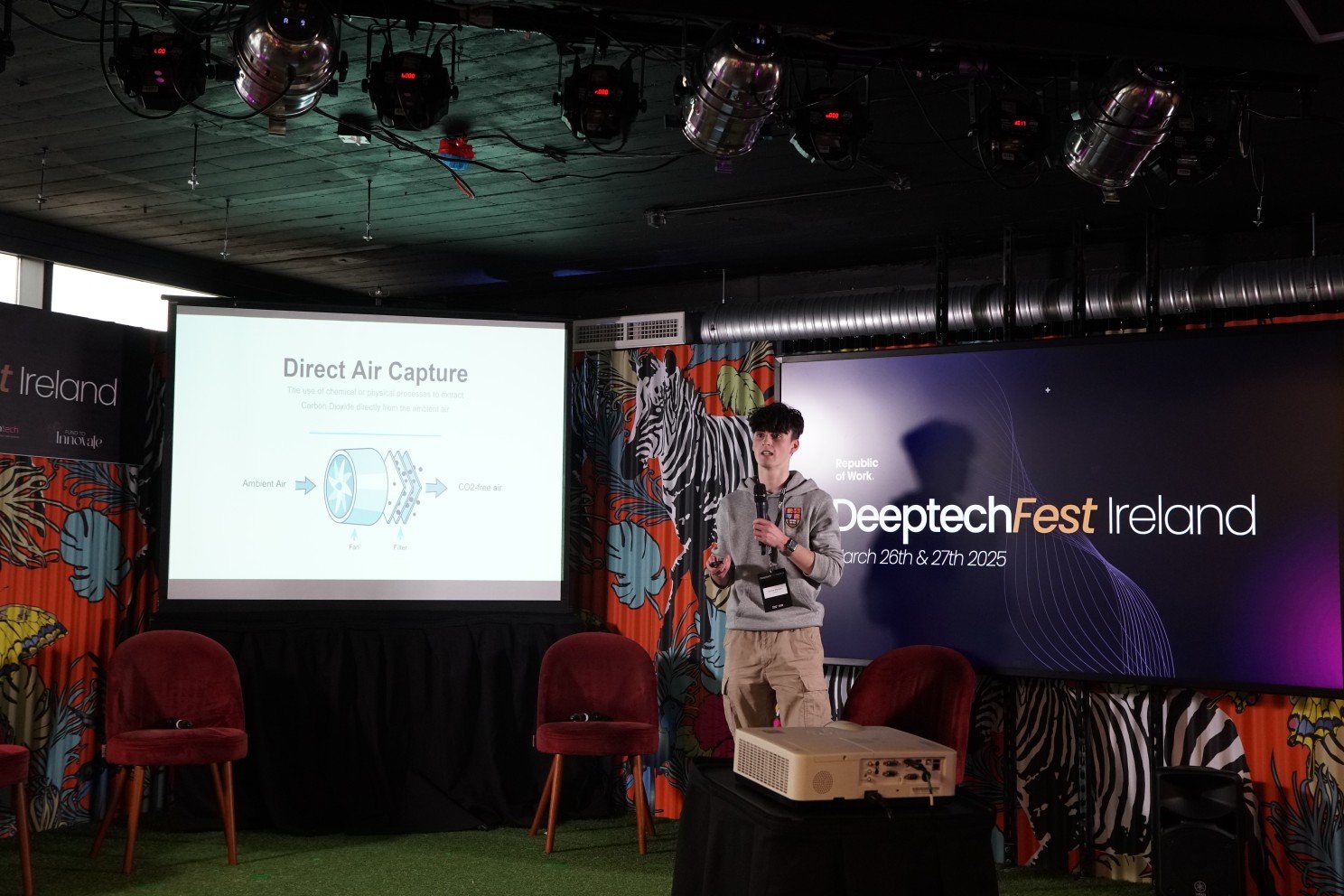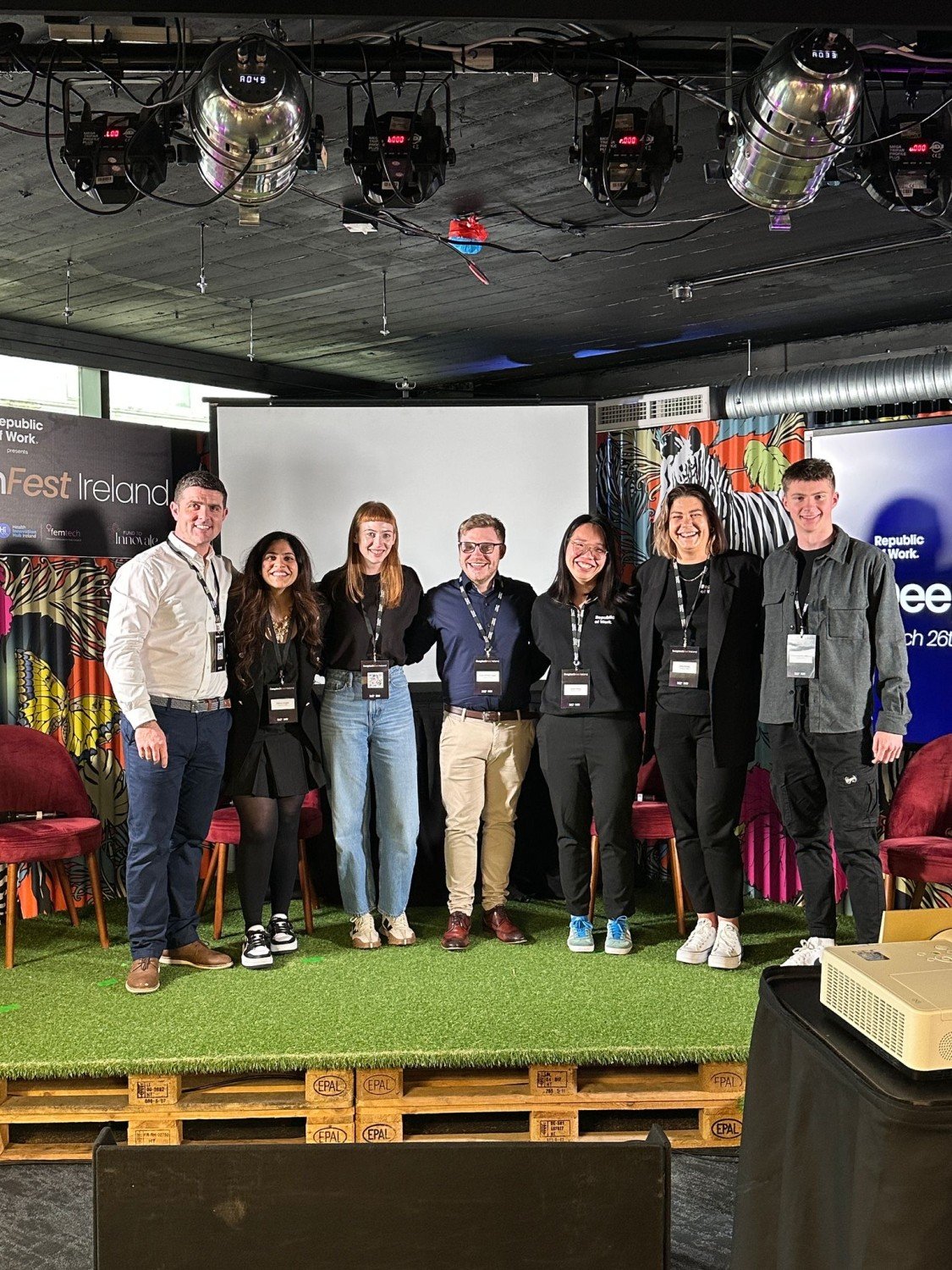DeeptechFest Ireland 2025 : Insights & Reflections
DeeptechFest started as a series of roundtables in 2022 for founders and researchers. When we started this, the goal was simple-to build a space where science meets business, research meets investment and where deeptech founders don’t just find support but actually gain the momentum to scale.
And that’s what DeeptechFest was about-connecting, collaborating and turning ideas into action. Over two packed days, we brought together pioneers from across Europe, the U.S. and every corner of Ireland to tackle the realities of scaling deeptech; what works, what doesn’t and what it truly takes to turn cutting-edge innovation into world-changing companies.
1. From Lab to Market: The Hard Road to PMF
Will Tope's (LiNa Energy) keynote session on scaling deeptech cut through the noise, laying out what it really takes to secure that first customer.
“Deeptech isn’t for the faint of heart - it’s a relentless cycle of building, breaking, learning and repeating. Failure, burnout and slow progress are inevitable, but inch by inch, step by step, founders push closer to product readiness. The bar is high and only those with true grit, resilience and unbeatable tech will thrive.”
The message was clear: deep tech isn’t a sprint, and those who succeed do so through sheer persistence and execution.
Keynote Session | Building Deeptech that Powers the Planet (Will Tope, LiNa Energy)
2. Cracking the Deeptech Capital Code
One of the biggest challenges in this space? Funding. The Cracking the Deeptech Capital Code panel tackled this head-on, revealing what investors truly look for.
“We’ll invest in a leader without a team but not a team without a leader.” Denise Sidhu, Kernel Capital.
Meanwhile, Harry Morgan (7percent Ventures) challenged the reliance on data-driven models at the pre-seed stage, instead emphasising the importance of founders with steely determination, the ability to command a room, and an unstoppable drive to build-regardless of the obstacles.
“What’s consistent about the founders we’ve invested in is that they all have this steely commitment to solving problems with innovative solutions.”
But beyond the hustle, the real challenge for deeptech startups is bridging the gap between technical expertise and commercialisation. Investors aren’t just looking for groundbreaking technology-they’re looking for founders who understand the pathway to market.
For many, universities play a critical role in this journey. As Tara Dalton, CEO - ALTRATECH LIMITED pointed out:
“The university support was instrumental-it opened up fantastic grant funding opportunities without a ticking clock or exchanging equity.”
Panel | Cracking the Deeptech Capital Code (L-R: Suzanne Mills, Harry Morgan, Denise Sidhu and Tara Dalton)
3. Bringing science to market
This bridging of science and commercialisation set the stage perfectly for our next keynote by Susan Schofer , HAX - SOSV ~ Bringing Science to Market.
She nailed a crucial truth about bringing deeptech to market:
“When you have a device and show it actually works, with customers seeing the value—that’s how you know the rubber is hitting the tarmac.”
Because building tech is one thing, but proving real-world impact? That’s the moment everything changes.
Keynote Session | Prototype to Product: Bringing Science to Market (Susan Schofer, HAX-SOSV)
4. ClimateTech2050 - Which innovations will thrive?
As the world races toward net zero, one thing became crystal clear in our ClimateTech 2050 discussion—the future of deeptech is deeply intertwined with energy abundance. Innovation at scale requires not just breakthroughs in science but the infrastructure to support them.
During our Panel on ClimateTech2050 - Which innovations will thrive, Caitriona Kelleher (Hatch Blue) put it bluntly:
“A great enabler for deeptech will be the abundance of renewable energy-it will translate to unlocking much more opportunities for innovation in this space.”
But beyond energy, what truly drives deeptech forward whether it's in climatetech space or any other sector?
Julien Fredonie reinforced that founders are at the core of tech - and that failure is just as vital as success. When discussing the impact of both wins and setbacks on the future of emerging companies, he pointed to examples like Northvolt and Lilium, emphasising that challenges in building startups not only fuel innovation but also inspire a new wave of entrepreneurs to push the boundaries of what’s possible.
“Our mission is to be the voice of the founders-they are the important ones who make or break deeptech advances.”
And while we often talk about funding, technology and policy, mindset shifts play an equally vital role. Pippa Gawley( Zero Carbon Capital) highlighted how the post-pandemic world has reshaped perceptions of science and innovation:
“COVID-19 came with a silver lining—people realized the value of scientists, and this pandemic demonstrated the agility of innovation when solutions are truly needed.”
Panel | ClimateTech 2050 - Which innovations will thrive? (L-R | Lavanya Bhandari, Caitriona Kelleher, Pippa Gawley and Julien Fredonie)
5. Ladies First: Breaking Barriers in Women's Health
While deeptech has been instrumental in transforming industries, one sector remains critically underserved-women’s health. The final sessions of the day tackled this head-on, underscoring the urgent need for innovation in Femtech.
Dr Tanya Mulcahy PhD ’s (Health Innovation Hub Ireland) overview of the Women’s Health landscape delivered some of the most striking moments of the day. The statistics spoke for themselves:
Less than 5% of global health research budgets go to women’s health.
Due to questionable FDA policy decisions in the 1970s, all women of childbearing age were excluded from clinical trials—a legacy that still impacts medical research today.
Autoimmune diseases? Women are 80% more likely to be affected.
Migraines? A 3:1 female-to-male ratio.
Osteoporosis? 80% of cases occur in women.
Breast cancer? 99% of cases affect women.
Her message was clear:
“It’s critical we accelerate change and begin a focus on the 50% of the population that have been underserved.”
Susan Schofer underscored the opportunity that comes with this challenge:
“The silver lining to Femtech being ignored for the last 200 years is we all have the opportunity of being part of that positive and needed change.”
Yet, even with the growing recognition of the problem, one major obstacle remains: funding especially in Ireland.
As Rosanne Longmore(Coroflo) pointed out:
“There are very few startups that couldn’t grow if they had access to funding—if you can keep the doors open, build quicker, and hire better, we’d see corresponding results.”
Marie-Therese Maher (NUA SURGICAL) summed it up perfectly:
“What gets measured gets done—so we needed to examine the statistics and results in order to create impact.”
Panel | Ladies First:Breaking Barriers in Women's Health (L-R| Tanya Mulcahy, Rosanne Longmore, Susan Schofer and Marie-Therese Maher)
What’s Next?
Everyone in the room walked away with powerful insights—on building a startup in deeptech, understanding the right moments to ask for help, and defining meaningful milestones along the journey. But beyond the talks, the real impact of DeeptechFest was in the conversations it sparked.
What became evident is that while Ireland’s deeptech ecosystem is growing. This was evident in one of our lightening talks that featured this year's BTYSTE Awardee - Tomás Markey on PM-DAC System.
Lightening Talk on PM-DAC System (Tomas Markey, Student)
BUT WE NEED MORE!
More companies emerging from our universities. More funding from national and international VCs. More founders willing to take on the challenge.
DeeptechFest Ireland wasn’t just about ideas—it was about execution. And if this year’s speakers and attendees proved anything, it’s that we have the talent, resilience and ambition to make Ireland a deeptech powerhouse, now, it’s up to us to take the next step.
Republic of Work Team (L-R - Frank Brennan, Eshna Gogia, Caroline Kennedy, Andy McManagan, Lucia Yang, Oral Hurley and Michael Sweeney)
We’re incredibly grateful to our sponsors and knowledge partners: SOSV , Local Enterprise Office Cork City , Health Innovation Hub Ireland and FundtoInnovate Limited . A special thank you to our pitch battle sponsors, Cunningham Solicitors and FCC Advisory, for their support. Congratulations to Siobhán Kelleher on winning DeeptechFest Pitch Battle 2025; building OnaWave Medical a medtech company that focuses on improving the diagnosis and treatment of pelvic conditions.
This article was written by Eshna Gogia. It was originally published in her personal newsletter. The author has kindly granted permission for it to be republished here.










